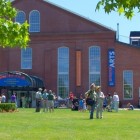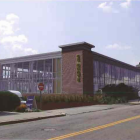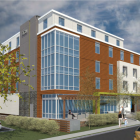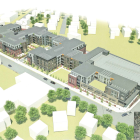Arsenal on the Charles
Athenahealth Gets OK to Start Master Plan, With Some Alterations
|
Many neighbors and other residents are worried about what the new Arsenal on the Charles complex will look like, and the owners – athenahealth – will now be able to make give a more detailed presentation after the Town Council approved a master plan process. Athenahealth purchased the former U.S. Army complex from Harvard University, and plans to make a corporate headquarters with a retail section. The company wants to know they will be able to do the whole project, and seeks to get a master plan approved to layout the changes. Monday night the Town Council approved changing in the town zoning that will allow for a master plan to be proposed, and added some limits to what can be built at the Arsenal. New buildings, a parking garage and glassing in the space between the set of long buildings on the eastside of the Arsenal are proposed.



